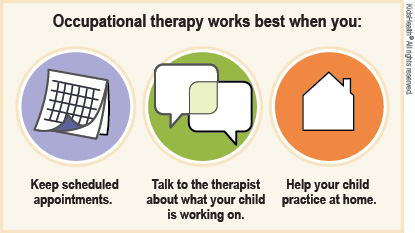Occupational Therapy: What to Expect
Some people may think that occupational therapy is only for adults because kids don't have occupations. But occupational therapists can check kids' skills for playing, school performance, and daily activities. They compare them with what is typical for that age group.


Occupational therapy (OT) can help kids who have trouble with everyday activities. For example, OT might help a child with sorting shapes, handwriting, brushing teeth, playing with other kids, or getting dressed. A child may need OT because of a learning difference, injury, illness, slow development, or other health issue.
At the first appointment, the occupational therapist will ask questions about your child and his or her challenges. The therapist also may involve your child in games or other activities. This helps the therapist learn about your child and make a plan to help.
Based on what a child needs, the occupational therapist might help him or her work on:
-
Fine motor skills: "Motor skills" refers to how well people control their muscles. Fine motor skills involve small muscles. These are the muscles that control the hands, fingers, face, and feet. A child working on fine motor skills might learn to pick up toys, tie shoelaces, or write more clearly.
-
Hand-eye coordination: OT uses special games, toys, and computer software to help kids use their hands and eyes together.
-
Everyday tasks: Some kids might work on self-care. This can involve things like bathing, getting dressed, and feeding themselves.
-
Social skills: Shy kids might work on finding ways to get to know people. Other kids might work on ways to deal with anger (without hitting or yelling). Some kids may need help understanding how to play and talk with other kids in a comfortable way.
-
Assistive technology: Assistive technology helps people with daily activities. Wheelchairs, text-to-speech software, pencil grips, and calculators are examples of assistive technology. OT can help a child use assistive technology the right way.
-
Posture and comfort: A child with back or hand problems might learn better ways to sit when writing or working on a computer.
-
Sensory skills: Sensory skills are how the brain gets and reacts to messages from sights, tastes, sounds, movement, and body position. OT can help if a child is either responding too much or too little to these sensations. For example, a child who is bothered by the noise in the school cafeteria may work on getting more comfortable with typical noise levels.
Parents or guardians are a vital part of a child's therapy plan. The therapist might ask you to go to appointments with your child and help your child practice new skills at home.

-
Follow the therapist's directions about practicing new skills at home.
-
Talk with staff at school to see if your child should have an Individualized Education Program (IEP) or a 504 plan. An IEP or a 504 plan can help children get the support they need to be successful at school.